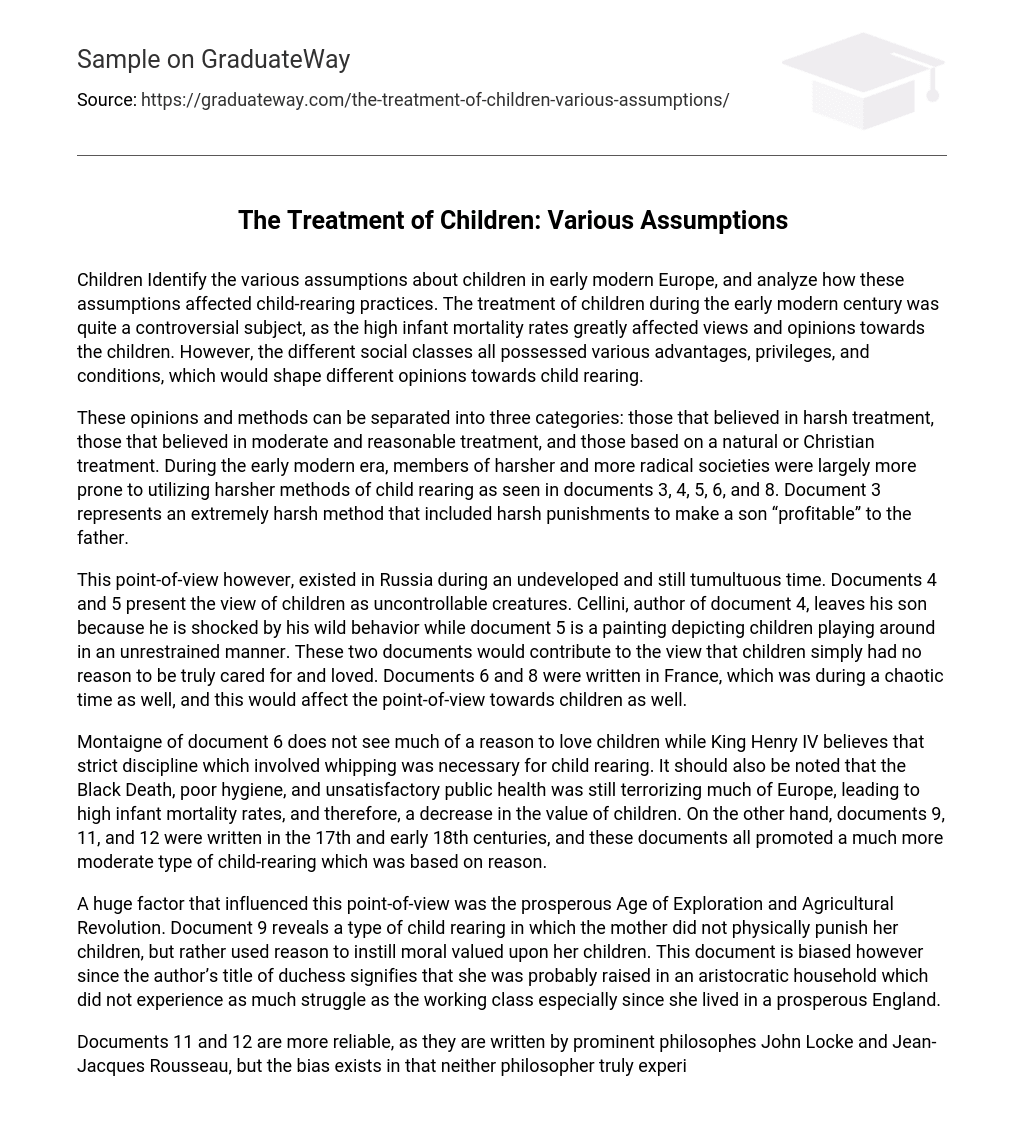The treatment of children during the early modern century was quite a controversial subject, as the high infant mortality rates greatly affected views and opinions towards the children. However, the different social classes all possessed various advantages, privileges, and conditions, which would shape different opinions towards child rearing.
These opinions and methods can be separated into three categories: those that believed in harsh treatment, those that believed in moderate and reasonable treatment, and those based on a natural or Christian treatment. During the early modern era, members of harsher and more radical societies were largely more prone to utilizing harsher methods of child rearing as seen in documents 3, 4, 5, 6, and 8. Document 3 represents an extremely harsh method that included harsh punishments to make a son “profitable” to the father.
This point-of-view however, existed in Russia during an undeveloped and still tumultuous time. Documents 4 and 5 present the view of children as uncontrollable creatures. Cellini, author of document 4, leaves his son because he is shocked by his wild behavior while document 5 is a painting depicting children playing around in an unrestrained manner. These two documents would contribute to the view that children simply had no reason to be truly cared for and loved. Documents 6 and 8 were written in France, which was during a chaotic time as well, and this would affect the point-of-view towards children as well.
Montaigne of document 6 does not see much of a reason to love children while King Henry IV believes that strict discipline which involved whipping was necessary for child rearing. It should also be noted that the Black Death, poor hygiene, and unsatisfactory public health was still terrorizing much of Europe, leading to high infant mortality rates, and therefore, a decrease in the value of children. On the other hand, documents 9, 11, and 12 were written in the 17th and early 18th centuries, and these documents all promoted a much more moderate type of child-rearing which was based on reason.
A huge factor that influenced this point-of-view was the prosperous Age of Exploration and Agricultural Revolution. Document 9 reveals a type of child rearing in which the mother did not physically punish her children, but rather used reason to instill moral valued upon her children. This document is biased however since the author’s title of duchess signifies that she was probably raised in an aristocratic household which did not experience as much struggle as the working class especially since she lived in a prosperous England.
Documents 11 and 12 are more reliable, as they are written by prominent philosophes John Locke and Jean-Jacques Rousseau, but the bias exists in that neither philosopher truly experienced the draconian lifestyle of the working class. Both, however, advocate the treatment of rational children with rational methods, with a balance between rigor and indulgence. Documents 7 and 10 promote a similar view of reason, but both are based on Christianity. Document 7 proposes that the child should not absolutely obey his/her parents, but should use his/her own judgment regarding what is right or wrong.
However, is should be noted that this document is written from the point-of-view of a preacher who is inclined to advocate moral behavior, disregarding true hardships and social situations. Document 10 is a dialogue that advocates that the child should live morally through a relationship with god rather than absolute obedience to the father. Documents 1 and 2 show a far more loving view towards children based on “natural love”. In document 1, a German diplomat takes great pride in his son who he sees as extremely gifted and educated.
This document however, is biased once again, since his status as a diplomat indicates that his family was probably far more well-off, allowing this point-of-view to develop during harsh times. Martin Luther, in document 2, is so saddened by the death of his daughter who he “naturally” loved that he could not even find comfort in God.
In conclusion, during the eventful modern era of Europe, the views towards child-rearing could be separated into harsh methods, rationalist methods, and natural/Christian methods.





